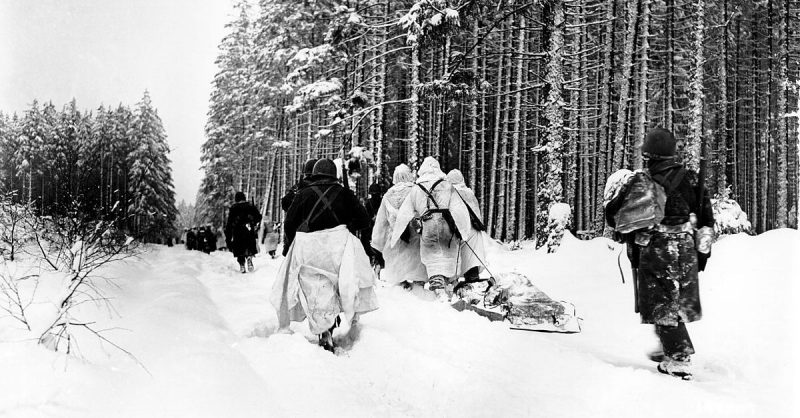On Christmas Day 1944, Ross Bouyea split a chocolate bar with another soldier he met that day and never saw him again. It was the only thing he had eaten in three days. Only 19 years old, Bouyea was waiting outside of Bastogne, Belgium, with the US Army 83rd Infantry Division before the Battle of the Bulge, the largest and bloodiest battle the US experienced in the Second World War.
The snow was three feet deep, and the temperature was well below freezing. They fought from December through to late January 1945 in the forest of Ardennes, which stretched through Belgium and Luxembourg and on into France and Germany.
Dried mud caked the inside of his boots, insulating them and keeing his feet from freezing. He had an insulated jacket, a backpack, and a carbine, all of which were very heavy.
They couldn’t start fires, and it was impossible to sit comfortably.
The Germans’ goal was to take Bastogne from the Allies. Controlling Bastogne gave access to the port city of Antwerp. The Axis forces were looking to use Antwerp to cut the Allies off. They had the city under siege, and the Allies’ defense was wearing down.
Bouyea had arrived with his division to help General George Patton’s forces as they sought to relieve the Bastogne defense. They were starting on the day after Christmas.
“We figured that was the last battle, and it was,” he said. “After we won that battle there, that was the beginning of the end of the war.”
While they waited, Bouyea began chatting with Jack Miner, a soldier from another platoon that Bouyea had just met that day.
They discussed the battle, the impending victory over the Germans, and their hunger.
“All we were thinking about was food,” Bouyea said.
He searched through his backpack and finally found a fruit bar, but it was completely frozen. The two men tried to break it apart with their steel helmets but had no luck.
So Bouyea checked one more time and found the chocolate bar. The two split it in half, ate, and turned their attention to the valley below them. They knew that the Germans were in that valley, waiting for them.
Bouyea had fought in the follow up at Omaha Beach after D-Day on June 18, 1944. He fought across the Rhineland and at the Battle of Hürtgen Forest. Three days later, he was on the front lines behind a pair of tanks.
He returned home on December 5, 1945, and was reunited with his wife, whom he had married in 1940.
She passed away in 2010 in the home where Bouyea still lives with his black and white photos of her and with his military memorabilia.
Bouyea came home with several military medals and a bonus medal: an 1813 Prussian Iron Cross from the Napoleonic Wars which was awarded for bravery. He took the Iron Cross from the body of a deceased German officer.
Lately, Bouyea has been working with North Country Honor Flight visiting schools along with other veterans, pressrepublican.com reported.
He flew with the Honor Flight in 2013 to see the war memorials in Washington, DC.
Before working with Honor Flight, he didn’t speak much about his wartime experiences. Now he speaks freely about his time during the war.
